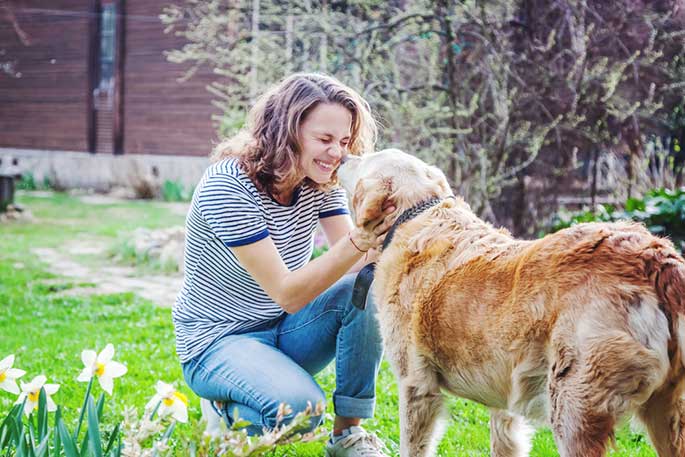
Aging is a natural process for every living being, including dogs. At about seven years of age, a dog can be referred to as a ‘senior’. Here are some of the signs of a senior dog:
- Thinning coat
- Sore or stiff joints
- Tire more easily
- Less tolerant of extreme temperatures
- Graying fur, more so around the muzzle
- Increased separation anxiety
- Bumps and lumps (due to a slipping immune system)
- More irritable
- Changes in urination and bowel movement
- Loss of vision, sight or/and sense of smell
Just like humans, dogs need special care when they get old. Senior dogs are more prone to injury and illness than younger ones. Here are some of the ways you can ensure that dogs remain comfortable and healthy for years to come.
1. Schedule Regular Vet Visits
Prevention is better than cure. Therefore, be sure to take your dog to the vet as often as possible, even if he/she has no visible health issues. Preferably, it would help if you went for a checkup at least once every six months. The medical tests and professional observation will ensure early diagnosis and treatment of ailments.
2. Exercise Your Senior Dog
Exercise will keep your senior dog active and help maintain healthy muscles and joints. When waking your dogs, be sure to use a short route in case they get tired. You must also ensure that the weather conditions are right. Senior dogs don’t cope too well with very low or high temperatures. Since your dog is probably losing his hearing or sight, stick to familiar places and routes. Finally, walk at the dog’s pace and avoid rushing them. You can offer dog treats CBD to your senior dog as a reward that is also helpful for your dog with anxiety, chronic pain, and other health issues.
Since dogs love being in the water, swimming is another form of exercise to consider. The great thing about swimming is that it doesn’t put much strain on sore joints. However, be sure to dry them off as soon as they get out of the water.
When indoors, you can use different games and toys to keep your dog active.
3. Maintain Dental Care
Poor dental health can have a major effect on a senior dog’s overall health. Pain in the mouth as a result of gum disease will make it difficult for your dog to eat his meals. This will result in an unkempt hair coat and weight loss. Bacteria in the gums can make its way into the bloodstream and affect the liver, kidneys, heart, and other bodily functions.
To avoid all these, consider taking your dog for a professional dental cleaning at least once every six months. It would help if you also brush your dog’s teeth regularly at home using dog toothpaste and a dog toothbrush. If the dog’s teeth are healthy enough, get some chew toys. Chewing will help remove debris from their teeth, strengthen their jaw muscles, and stimulate them mentally.
4. Adjust the Diet
As dogs get older, they tend to get obese due to less mobility and less energy. Overweight dogs are very susceptible to skin-related issues, heart ailments, diabetes, and even cancer. It is, therefore, crucial to change your dog’s diet as they grow older. A top-quality and balanced diet will help maintain the health of your dog. Feed him soybeans, flax seeds, and fish, which are rich in vital fatty acids. Don’t forget to give him different fruits and vegetables to meet their need for phytonutrients. Finally, provide foods rich in L-Carnitine, which helps the body use fat for energy.
5. Try Canine Therapy
If you notice some stiffness or limping in your senior dog, you can use different kinds of therapy to relieve the pain:
- Laser therapy is a relatively affordable way of treating muscle strains, chronic injuries, post-surgery injuries, and arthritis
- Is your dog suffering from inflammation, joint problems, dementia or anxiety? CBD oil can ease the discomfort and provide cognitive support
- Hydrotherapy is also very effective in dealing with pain-related problems. The vet uses warm water to treat the soreness of joints and muscles of the dog
- Chronic stomach pain, spinal issues, and arthritis can be treated using acupuncture
6. Maintain a Practice of Good Grooming
Grooming is very critical throughout a dog’s life. Wash the dog regularly using warm water and shampoo, which is non-abrasive. When bathing the dog or brushing their hair, look for any abnormal signs such as lumps, growths, skin irritations, or warts. This could be an indicator of underlying health issues. Regular nail trimming is also very important for older dogs, especially those that have joint problems or arthritis.
7. Protect Them from Weather Extremes
As mentioned earlier, senior dogs get very uncomfortable in extreme weather conditions. If it is cold or snowing outside, provide dog boots or a warm fleece blanket. When indoors, make sure he is covered to keep him warm. You could even move his bed closer to the fireplace. During summer, make sure the dog gets cool water to swim or bathe, as well as ample shade.
Conclusion
The tips above will help keep your senior dog happy and healthy throughout their golden years. If you need more information, there are plenty of resources online that could be helpful. Don’t forget to consult your vet regularly for personalized advice.
Charles Mburugu is a HubSpot-certified content writer/marketer for B2B, B2C, and SaaS companies. He has worked with brands such as GetResponse, Neil Patel, Shopify, 99 Designs, Oberlo, Salesforce, and Condor. Check out his portfolio and connect on LinkedIn.



